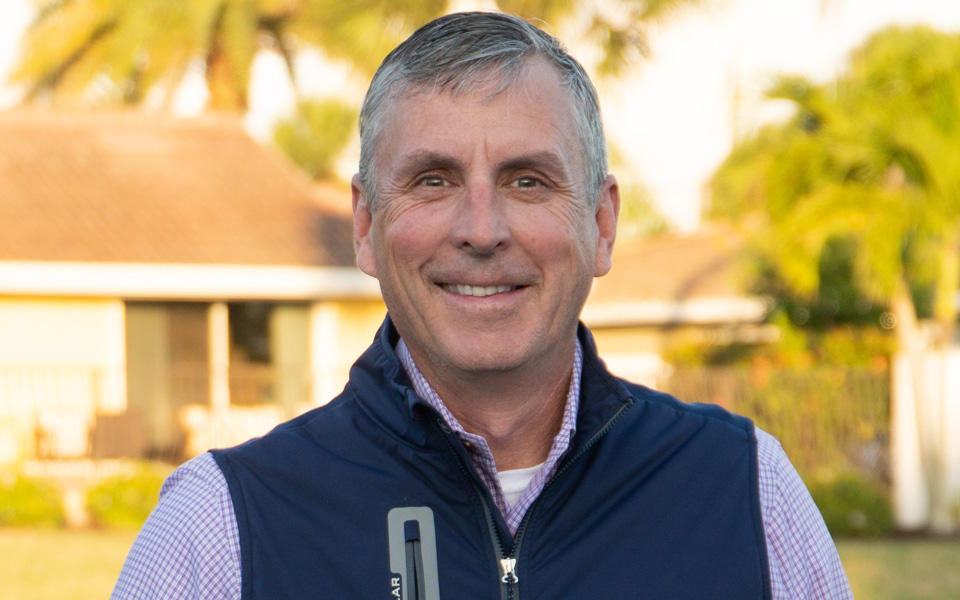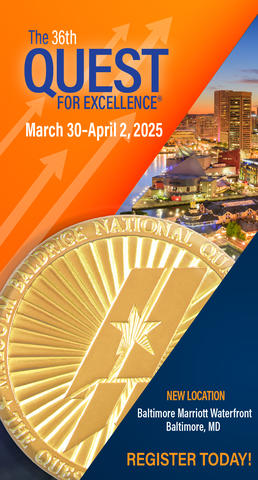Blogrige
The Official Baldrige Blog

Robert Martichenko, Closing Keynote speaker, 35th Baldrige Quest for Excellence® Conference
Is your organization challenged by high turnover and low engagement, especially among frontline employees? What’s more, are you prepared to meet changing workforce needs so you can attract and retain high-performing employees in the future?
In either case, Robert Martichenko has insights to help you. Martichenko, chair of TrailPaths Inc., a company focused on creating meaningful employment environments, will present the second keynote address at the Baldrige Program's upcoming 35th Quest for Excellence® Conference.
Drawing from research and his experiences in supply chain, manufacturing, and other business and nonprofit environments, Martichenko will discuss (1) the future of workforce development in light of changing population demographics and societal attitudes, (2) lessons learned for achieving operational excellence across a business enterprise, and (3) why organizations must focus on employees’ dignity and need for meaningful work, as well as (4) how to improve the work environment to meet those needs.
The Workforce “Revolution”
With a background in the corporate world, Martichenko said he “spent a lot of time in manufacturing environments while in the supply chain and logistics industry.” After supporting Toyota early in his career, Martichenko spent more than 15 years as the founding CEO of the LeanCor Supply Chain Group, where he focused on implementing Lean principles for efficiency across business supply chains. Outside his current position as TrailPaths Inc. chair, Martichenko has volunteered for nonprofit organizations while also serving on business advisory boards, including those for the Association for Manufacturing Excellence and the American Logistics Aid Network.
In recent years, as he observed the workforce-related “revolution going on” that has fueled high turnover in many organizations, Martichenko said he became aware of three key forces behind the changes. He identified those as (1) an aging U.S. population that is shrinking the nation’s workforce due to retirements, (2) changing attitudes about workplaces among younger generations—especially employees’ wanting more flexibility in where they work—and (3) lessons learned from businesses’ formal programs for maximizing the efficiency of work processes. Those efforts have shown that “if people aren’t participating, the goal of operational excellence will never be realized,” said Martichenko.
He pointed out that people and process are both core factors for achieving operational excellence, and “we’re now pivoting to focus specifically on the people side.”
What Employees Need
To meet employees’ fundamental needs as human beings, said Martichenko, leaders of businesses and other organizations must “treat them with respect and kindness and make sure the work itself is at least somewhat meaningful and not riddled with obstacles and dynamics that make it less than pleasurable.”
Beyond basic needs, he said, employees need autonomy and control, fairness and equity, and social community to be highly engaged in their work. Yet “rules for hourly employees are often the opposite of what they are for salaried employees,” he pointed out, “so fairness and equity are undermined.”
For leaders to make employment environments meaningful, above all he advises, “make organizational decisions with the basic needs for respect and dignity of the employees in mind.”
“Two core things that leaders need to do are treat people with dignity and focus on making the work meaningful,” he said.
“It takes a commitment to make work meaningful,” he added. “We have to create an environment where team members want to participate.”
Attention to Frontline Workers
Martichenko also stressed that in the United States today, over 70 million people are paid by the hour—so frontline work is half the work done in the United States. “Almost half of our employment base is being ignored when we talk about working from home,” he said.
For some industries, particularly the hospitality and personal health care industries, the work is difficult, challenging, and doesn’t pay well, so creating meaningful work will become essential, he added.
After defining resilience as the ability to see change through—to realize a future state, Martichenko stated,
“It will be impossible for an organization to become resilient if they don’t have resilience within their workforce.”
He gave two examples of how to make frontline work meaningful:
- “Presume that there is value in every task asked of employees. So the first step is to make sure that the worker understands the value to the organization of the work they’re doing. Even if an employee is just moving a box, understand how this task is making someone else’s life better. Connect every person to the value they’re bringing.”
- A restaurant employee told Martichenko that she’d just like the work “to be less miserable.” To ensure that restaurant work is the most meaningful it can be, he said leaders should “train employees properly, making sure they understand the tools and resources available, and provide scheduling flexibility and maximize workers’ autonomy/control.”
Join us at the Quest for Excellence® 2024!

The Quest for Excellence® Conference
Sunday, April 7–Wednesday, April 10, 2024 | #BaldrigeQuest
The conference will feature new and exciting opportunities to learn role-model best practices from nationally recognized thought leaders, Baldrige Award recipients, and representatives from other high-performing organizations. Conference highlights include sessions focusing on organizational resilience and future emerging challenges and take-home solutions to help your organization achieve breakthrough performance in areas such as leadership; strategy; customers; measurement, analysis, and knowledge management; workforce; and operations.





